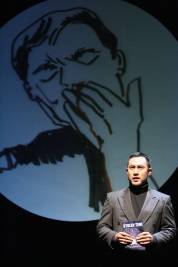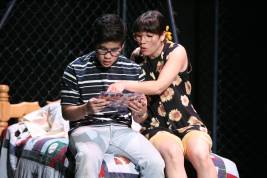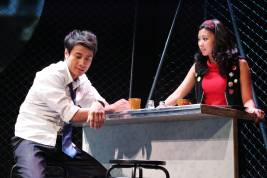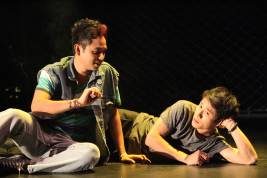
Mysterious Skin, Scott Heim’s powerful 1995 novel about two teenagers with a shared secret almost too horrendous to talk about, is the kind of book that would seem unadaptable to screen or stage, if only for its scenes of child sexual abuse. Still, miracle of miracles, Mysterious Skin The Movie and Mysterious Skin The Play did end up written, produced, and presented to audience bravos, the former by film maker Gregg Araki and the latter by playwright Prince Gomolvilas. It’s Gomolvilas’ ingenious stage adaptation that now gets an absolutely stunning Los Angeles Premiere at Little Tokyo’s East West Players in a production easily the Asian-American theater’s finest non-musical since Durango, three years ago.
Unlike novel or film, Gomolvilas’ cleverly conceived stage treatment contains no scenes between eight-year-old Brian and the adult character key to his childhood trauma, yet is no less effective for taking its own approach, one which begins with Benjamin (Marcus Choi), the host of an Unsolved Mysteries-like TV program, asking the audience, “Have aliens contacted you?” in a deliciously portentous voice. The host then goes on to list the “signals to look for,” including “missing days, hours, or even minutes that you cannot account for,” “the occurrence of unexplained bruises, sores, small puncture wounds…or nosebleeds,” and “continued interest in movies, trivia, or books about unidentified flying objects—sometimes to the point of obsession.”
Cut to a Kansas bedroom circa 1991, where thirty-two-year-old Avalyn Friesen (Elizabeth Liang) is showing eighteen-year-old Brian Lackey (Scott Keiji Takeda) a tiny scar on her inner thigh, which she says is evidence of having been “tagged, marked, branded” by aliens she claims to have been abducted by more than twenty times. Then Brian himself confesses to having lost four hours of his life at age eight, followed by a second blackout a couple years later. Obviously, declares Avalyn without a trace of uncertainty or irony, Brian too has been the victim of an alien abduction.
We then move to New York City, where gay eighteen-year-old Neil McCormick (David Huynh) reveals to longtime “fag hag” best friend Wendy (Christine Corpuz) that he has returned to hustling, a trade he eagerly undertook at the age of fifteen, early for some but not all that surprising for a kid who had his first sexual experience at age eight. (Neil’s claim that this happened because “I wanted it” and that “it was perfect” is at least one of several reasons Mysterious Skin has the word controversial stamped all over it.)
As Act One continues, the play’s action alternates between Kansas and New York, between 1991 and earlier years, between two very different pairs of characters and two very different stories, until a violent, traumatic encounter sends Neil back to his native Kansas where Act Two unfolds in a series of scenes almost entirely between the two teens, the contents of which will be not revealed in this review.
Theatergoers should be forewarned that child sexual abuse, though never shown, is talked about in explicit terms, that there is ample foul language (sometimes used for humorous effect as in “Someone call Ripley because I do not fucking believe it”), and a simulated yet graphic gay rape scene involving a very brief flash of frontal nudity.
Still, though socially conservative East West regulars may balk (and even write a few angry emails) about the R-rated subject matter, East West Players’ decision to push the envelope with Mysterious Skin will be greeted with cheers by audience members wanting to be challenged and dazzled by daring, beautifully staged and acted, cutting-edge material.
Gomolvilas’ script is brought to striking life by Tim Dang’s inspired direction, the performances he elicits from his superb cast among the best I’ve seen at East West.
At its heart are two very difficult-to-cast lead roles, both of which have been cast to perfection and are made absolutely, heartbreakingly real by a pair of gifted young actors. Looking considerably like the film adaptation’s Joseph Gordon-Levitt, Huynh makes for a potent blend of cocky swagger and boyish cuteness, his slight frame so perfectly at odds with Neil’s decade of sexual experience that it’s hard to imagine Dang having found a better choice for Heim’s antihero. And if Act One can be said to “belong” to Huynh’s foul-mouthed yet sweet-at-heart Neil, it’s Takeda who gets the prime acting challenge in Act Two, one which he nails to perfection, his character’s nerdy comic charm making way for some of the most moving work you’re likely to see any time soon.
Liang makes Avalyn totally her own, a terrific mix of weird, geeky, (outer)-spacey, and absolute certainty in her outrageous claims of alien abduction. Corpuz plays four characters, most importantly Brian’s loving, concerned Mom and Neil’s loving, concerned best friend, and differentiates so clearly between them, making them seem (among other things) decades apart in age, that it was not until intermission that I realized they were being played by the same actress. Choi shines too in five small roles, from the opening scene’s slick TV host to a married man trolling for sex with teenage hustlers to a violent john who initiates the production’s most sexually and physically explicit scene, which both Choi and Huynh play without a trace of self-consciousness. Completing the cast is Ruffy Landayan, doing fine work as Christopher, the teen hustler who initiates Neil into “the life,” and as Benjamin, the Modesto-to-Kansas transplant who dares not reveal his secret love for best friend Neil.
Set and projection designer Alan E. Muraoka’s decision to back up Mysterious Skin’s set with the kind of chain link fence which surrounds a baseball diamond’s home plate is an inspired one, and his imaginative projections which fill the huge full moon suspended center stage facilitate and clarify the play’s many scene and time changes. John Zalewski’s sound design is one of the master designer’s finest, with punch-in-the-gut sound jolts and subtle, suspense-enhancing hums which underscore much of the play. Nicholas Hirata has designed the cast’s character-defining wardrobe, from Neil’s worn jeans and dirty t-shirts to Brian’s and Avalyn’s nerdy garb to the costume changes which aid Corpuz and Choi in creating distinct characterization for each of their multiple roles. Jeremy Pivnick’s lighting design is dramatic and for the most part highly effective, the one brief exception being the lighting choice which concludes Act One, one which seems more likely than not to make audience members think that some technical glitch has taken place. Ken Takemoto is property manager and Ondina V. Dominguez is stage manager.
Mysterious Skin offers East West Players the rare opportunity to achieve two of its primary goals: to spotlight the work of an Asian American playwright and to give Asian American actors access to roles too often denied them by the kind of narrow-thinking casting that remains too often the rule, not only in Hollywood but in Los Angeles theater. With a baseball leitmotiv running throughout the play, it seems entirely appropriate to declare that with Mysterious Skin, Tim Dang and East West Players have scored a home run.
East West Players, David Henry Hwang Theatre, 120 Judge John Aiso St., Los Angeles.
www.eastwestplayers.org
–Steven Stanley
September 15, 2010
Photos: Michael Lamont







 Since 2007, Steven Stanley's StageSceneLA.com has spotlighted the best in Southern California theater via reviews, interviews, and its annual StageSceneLA Scenies.
Since 2007, Steven Stanley's StageSceneLA.com has spotlighted the best in Southern California theater via reviews, interviews, and its annual StageSceneLA Scenies.







 COPYRIGHT 2024 STEVEN STANLEY :: DESIGN BY
COPYRIGHT 2024 STEVEN STANLEY :: DESIGN BY